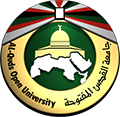Researches and Studies
- Cluster beans cultivation project (as fodder crops):
Research objectives Insertion of cluster beans crops to Palestine for the first time to be used as fodder crops for cows and sheep Research method Bean cultivation using drip irrigation network to be introduced to the crops’ water needs Timeframe 4-5 moths Expected results Production of fodder crops for the first time in Palestine with less quantity of irrigation, having alternatives for the expensive imported fodder crops
- Palm Weevil control project:
Research objectives Finding protective ways and methods of treatment for palm weevil lesion through using Chemical compounds and organic materials. Research method Using a mixture of chemical pesticides and organic materials to make mechanical blocker (insulation layer) to prevent the entrance of insects to the tree leg, in addition, it’s a preventive material that prevents the infectious injury of healthy trees. The pesticide will be prepared in the research center and the research experiments and field observations will be implemented in the palm farms which are infected. Research staff The research staff working in the University's center Timeframe One year Expected results from research project outcome Register the product’s patent after the declaration of its successful use in the palm farms, then, selling the patent for organizations like Talal Abu-Ghazaleh organization and distribute its value according to the rules of procedures used in the research centers.
- Fish Farming Project:
Research objectives - Utilize the natural resources and keeping them especially water through closed and modern agricultural techniques and systems that doesn’t allow wasting water.
- Producing organic products and avoid using chemical pesticides and fertilizers that harm the environment and human’s health.
- Distribute and promote this modern agricultural technique in the Palestinian market on a scientific basis with the aim of increasing the Palestinian farmer's income and increasing the culture of producing organic crops.
- Provide the center with additional source of income besides doing some research on the system.
Research method (Project Components) Half a donum protected house using Intensive hierarchical farming type, aquarium for raising fish, with farming space enriched with volcanic sediments. Timeframe This system need (30 – 45) days to be prepared. Expected results from the research project’s outcome Produce organic vegetables free of chemical materials, produce fish, distribute and promote an environment friendly modern agricultural technique.
- Medical and aromatic plants cultivation project:
Research objectives - Producing extracts (bioactive organic pesticides) preventive and curative.
- Producing nutrimental oils.
Research method - Cultivating a number of medical and aromatic plants (Thyme, basil, Lavender, and rosemary).
- Extracting products using machines available in the soil, irrigation and plants laboratories.
Timeframe (2-3) years Expected results from research project’s outcomes - Producing bioactive organic pesticides
- Producing nutrimental and curative oils.
- Producing hybrid vegetables seeds that bear drought and salinity conditions project
Research objectives Producing hybrid and improved vegetables seeds that bear drought and soil’s and irrigation water’s salinity, with good qualitative and quantitative characteristics (Quality). Research method (project’s components) Hybridization of male and female flowers to produce hybrid varieties. Timeframe Two years Expected results from research project’s outcomes - Producing hybrid types with good productive characteristics in suitable prices and competitive with the imported types.
- Acquiring a patent after entering the agricultural market successfully.
The First Stage: implementing the agricultural research program will depend on the research center staff.
The Second Stage: on the light of the expanding research activities, consultancies and trainings, they will be implemented in cooperation with expertise from the public and private national organizations in order to keep in line with the modern technologies and developments in the agricultural sector.


